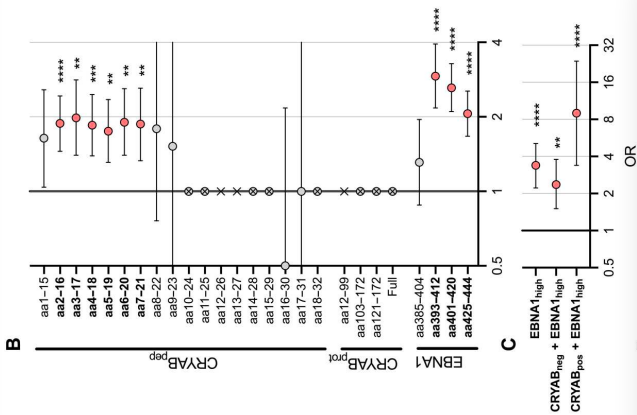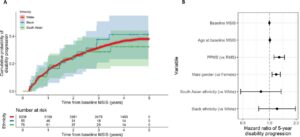
Olivia G. Thomas, et al. – Karolinska Institute. Sci Adv.
This study found that patients with MS have autoantibodies against alpha-crystallin B (CRYAB) that cross-react with an epitope in the EBV protein EBNA1. Given that CRYAB is produced by oligodendrocytes in MS lesions to downregulate innate immunity responses, these autoantibodies could create a positive feedback loop, where CRYAB expression in response to inflammation triggers a stronger adaptive autoimmune response.
“MWF of the corpus callosum is a robust measure of remyelination: Results from the ReBUILD trial.”
Eduardo Caverzasi, et al. – UCSF Weill Institute for Neurosciences. PNAS.
In this study, remyelination of the corpus callosum was associated with an increase in the myelin water fraction during 3T MRI, suggesting this may be a convenient measurement for assessing remyelination in patients with MS.
Shannon Kolind, et al. – University of British Columbia. Mult Scler.
Over the 2-year period analyzed in this study, patients on ocrelizumab showed reductions in brain volume, generally and in specific regions, comparable to healthy controls, whereas patients on interferon-beta 1a showed greater reductions. These results indicate that this anti-inflammatory treatment is capable of reducing chronic neurological damage.
Benjamin M. Jacobs, et al. – Queen Mary University of London. BMJ Open.
This currently-enrolling study will examine the genetics of MS susceptibility in patients of diverse ancestral backgrounds. Given how previous studies have focused on cohorts of predominantly white European ancestry, this will help determine whether the findings of those studies generalize to more diverse cohorts, as well as identify risk factors specific to patients from other ancestral backgrounds.
“Modulation of microglial metabolism facilitates regeneration in demyelination.”
Chuan Qin, et al. – Huazhong University of Science and Technology. iScience.
In this study, the Type 2 Diabetes drug rosiglitazone was effective in shifting microglia from a phagocytic metabolic profile to one favoring remyelination, reducing myelination loss in an in vivo LPC demyelination model. While cardiovascular risks associated with rosiglitazone may preclude usage as an MS therapeutic, other drugs capable of inducing a similar metabolic shift may prove effective.
Alicia Gonzalez-Martinez, et al. – Brigham and Women’s Hospital. J Neuroinflammation.
This study found that serum levels of microRNA 548a-3p can serve as a biomarker for treatment efficacy, in terms of lack of disease activity, for patients using fingolimod. Future studies with other DMTs are needed to determine if this miRNA can be a general marker for treatment efficacy.
Find a Zotero library with these publications here.




